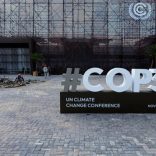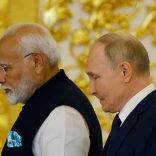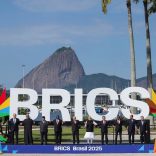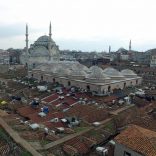EU in last-minute talks to set new climate goal for COP30
Maduro regains control of Venezuela’s National Assembly

Venezuela's President Nicolas Maduro speaks to the media next to Venezuela's Oil Minister Tareck El Aissami, Vice President Delcy Rodriguez and parliamentary candidates, his wife Cilia Flores and Jorge Rodriguez, in Caracas, Venezuela December 6, 2020. [Photo: AFP]
President Nicolas Maduro regained control of Venezuela’s National Assembly on Sunday, in a vote that was boycotted by the main opposition parties and rejected by some observers.
With no real opponents and widespread apathy, government-affiliated parties received 68% of votes, the electoral council announced early on Monday after counting more than 80% of ballots. The almost-inevitable landslide cements Maduro’s grip on the last major institution in the country that has democratic legitimacy. The new assembly will take over on January 5.
“This is a great victory for democracy,” Maduro said. “The people have chosen their new lawmakers.”
The EU said on Monday it did not consider Venezuela’s parliamentary election on Sunday free or fair, and called on Maduro to chart a path towards national reconciliation.
Maduro’s win further weakens the position of opposition leader Juan Guaido. He’s recognised as the legitimate ruler of Venezuela by the US and dozens of its allies, but that’s based on his status as head of congress, a position he’s about to lose.
Guaido and his allies boycotted the election, citing the absence of international monitors, while a minority segment of the opposition took part.
Voter turnout was low across the country. Official turnout stood at 31%, totalling 5.3-million voters, which compares with the opposition’s estimate of under 20% and to a 76% participation rate at the prior congressional vote of 2015.
The government tried to boost turnout through cash payments and food handouts. Maduro even promised to grant “special prizes” to the 100 communities with the highest participation rates.
Canada, Colombia, Brazil and the US were among the first to reject the election’s results, generally citing unfair conditions.
US sanctions
Maduro is likely try to use control of the National Assembly to try to bypass US sanctions and attract some foreign investment, especially through oil ventures, according to ORC director Oswaldo Ramirez. The assembly has to approve such investments.
“They were the ultimate traitors, calling for a plague of sanctions on their own people,” Maduro said of the acting assembly in a press conference after casting his vote around noon. “We were patient and resisted, and today we get justice.”
Though the main opposition parties didn’t participate, some of them still appeared on the ballot. That’s because the top court — packed with Maduro loyalists — suspended and replaced the boards of those parties to hand them over to government allies in an attempt to boost the election’s appearance of legitimacy.
The economy is suffering through its seventh straight year of contraction, with food shortages and annual inflation of 6,600%.












Leave a Reply
Be the First to Comment!
You must be logged in to post a comment.
You must be logged in to post a comment.